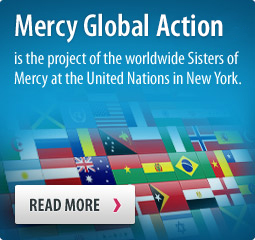
Zeroing-in on the Post 2015 Development Agenda: Introduction to Analysis Series
Announcements: December 15, 2014
A Mercy Global Action critical analysis of the proposed UN Sustainable Development Goals
Introduction
What are the Sustainable Development Goals (SDGs)?
The Millennium Development Goals (MDGs), which essentially guided global development since 2000, expire in 2015. The post -2015 development agenda is a United Nations process to set the international community’s development priorities for the next 15 years, and the Sustainable Development Goals (SDGs) and their targets (objectives) will be central to this agenda. In the current session of the General Assembly governments will enter a phase of negotiations on the proposed SDGs. World leaders are expected to adopt the finalized agenda at a Post-2015 Development Summit in New York in September 2015 and should then implement them with modifications suited to their respective domestic and international policies.
How do the SDGs differ from the MDGs?
| Proposed Sustainable Development Goals (SDGs) | Expiring Millennium Development Goals (MDGs) |
| • Created for a post-2015 global development agenda | • Created for a 2000-2015 global development agenda |
| • 17 proposed goals with 169 sub-targets | • 8 final goals |
| • Universal—focus on both developing and developed countries | • Focus on developing countries |
| • Focus on sustainable development, integration of social, economic, and environmental dimensions | • Focus primarily on combating poverty |
Since the beginning of the process, Mercy Global Action at the UN has been involved in advocacy work regarding the post-2015 agenda on behalf of the Sisters of Mercy worldwide. In particular, we have focused our advocacy on four issues:
(1) promoting a rights-based approach for just, equitable, and sustainable development;
(2) addressing root causes of poverty and human trafficking;
(3) critiquing the extractive development model; and
(4) realizing the human rights to water and sanitation. The 17 proposed SDGs and their 169 targets demand our critical attention and offer an opportunity for continued advocacy as member states negotiate and adopt them, as the only voting body of the UN.
What’s next in the UN process?
As members of the UN constituency commonly called “civil society,” we strongly desire to participate in the finalizing of the goals and their targets. At this time, however, the processes for possible involvement have yet to be determined. Still, a clear analysis of the key proposed SDGs at this point in the process is key for two reasons: first, in order to position ourselves for holding member states accountable; and second, to provide Mercy Global Action with the tools for advocacy worldwide. This demands that we:
- provide a solid critique of the critical goals and their targets,
- offer a transformative, holistic, and sustainable vision of development that is solidly based in human rights, and pressure our global leaders to do the same with a sense of urgency.
We must take every opportunity and seek every venue to realize a post-2015 global agenda that centers upon people and the planet.
What’s next for us?
In service to your Mercy Global Action advocacy, we will focus on several of the proposed SDGs and their targets that are closely aligned with our priority focus areas.
Thus, in the coming weeks we will:
- provide information on key proposed goals and targets;
- critically analyze the paradigms being proposed;
- assess the implications of these proposed paradigms for people and the planet;
- offer our perspectives on the SDGs’ strengths and our concerns and questions;
- invite your reflection and wisdom in advancing our common MGA strategy.
We encourage the Sisters of Mercy and other interested global citizens to join with us in this analysis. We believe it is essential to critically examine what is said, how is it said, what is left out, and the consequences of the particular language in place. In this light, we suggest that in analyzing the SDGs you ask questions like:
- What are some positive aspects of the SDGs and the specific targets?
- What are some foreseeable drawbacks?
- Who benefits?
- Who is burdened, excluded, or otherwise negatively affected?
The post-2015 development agenda must be community-centered on people first, and must promote the emergence of alternative models of development. It must be anchored in a human rights framework that honors justice and achievable within the ecological limits of Earth. World leaders have called for an ambitious, long-term agenda. As UN Secretary-General Ban Ki-moon declared, “Our goal is simple but daunting—prosperity and dignity for all in a world where humankind lives in harmony with nature.”
Beginning with this introduction today and continuing for the next several months, we invite you to join in this reflection.
Messages to:
Avery Kelly - MGA Intern
Aine O’Connor rsm - MGA Co-ordinator at the UN




